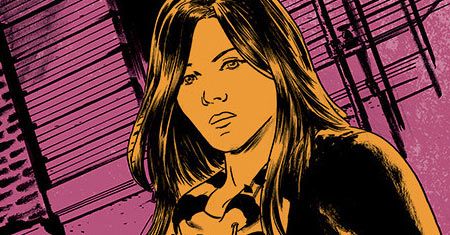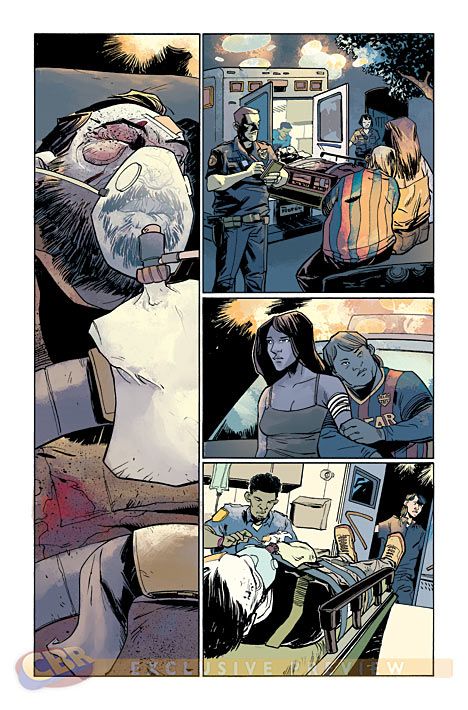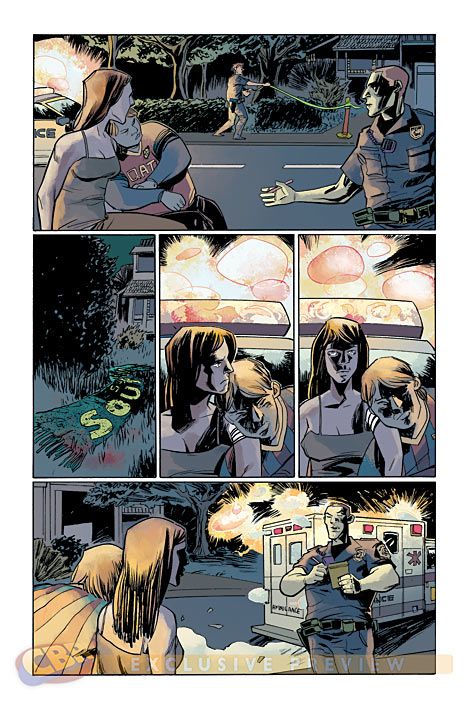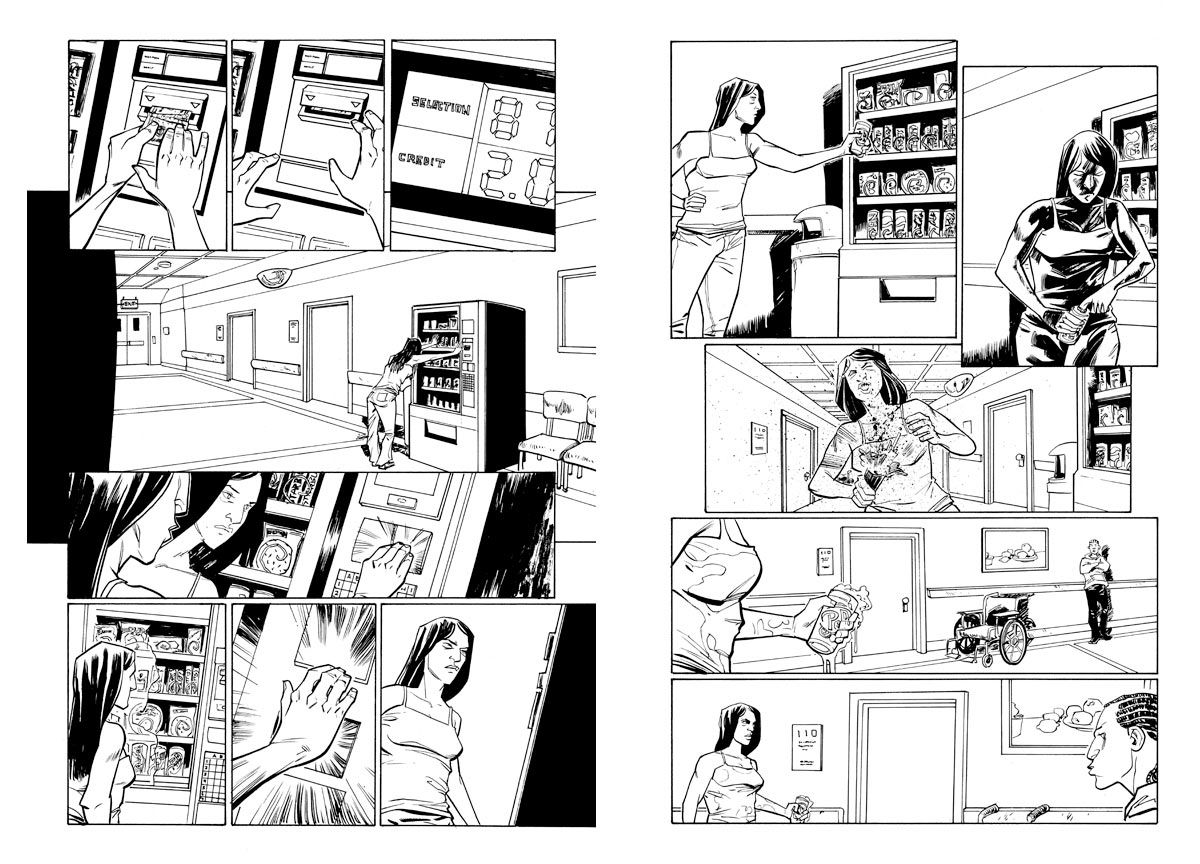This fall, Greg Rucka's acclaimed crime series "Stumptown" will be coming back to Oni Press, now as an ongoing series with new artist Justin Greenwood in tow. "Stumptown" continues the saga of Dex Parios, a struggling private detective in Portland, OR, who tackles the city's bizarre and banal mysteries with little more than a bulletproof vest and a pile of unpaid parking tickets.
RELATED: CBR TV: Rucka Talks Thematics of "Veil," Los Angeles & Staying Creator-Owned
Rucka took a break from his crazy deadlines -- he also writes "Lady Sabre and the Pirates of the Ineffable Ether," "Lazarus" and "Veil," as well as a recently announced "Cyclops" series -- to talk about his new relationship with incoming artist Greenwood and the darkness readers will see from his determined detective.
CBR News: Greg, it's so exciting that "Stumptown" is coming back, especially with Justin Greenwood on board as the artist. Let's talk about the format first -- is it going to resume the one arc/one case style? And when will the series be resuming?
Greg Rucka: The intent at the beginning was to do a story arc that would comprise a case, take a couple of months off and then do another story arc and so on and so forth. For an infinite variety of reasons, some of them very, very good, that never executed according to plan, but that was always what we had intended.
About the time we wrapped up the last arc, Matthew [Southworth] and I had a conversation where he came to me and said that there was other stuff he wanted to be doing and I said that was fair, totally cool. No bad blood there at all. We talked about how to continue the series equitably for everyone involved, talked to Oni Press about it, and then Justin Greenwood -- who ended up coming on board.
ECCC: Rucka, DeConnick & MOre on How Comics Can Be More Inclusive

We're coming back this Fall because that gives us enough lead-time to bank some issues. We hopefully won't have any scheduling issues as we come out. That's due more to me than Justin; he's a machine. He's got an amazing work ethic. It's a question of me being able to juggle my schedule so I'm getting scripts to him on time.
What are you looking forward to from a more regular publishing schedule?
The first case we're doing is about five issues. One of the things we will ideally be able to do with a more regular publishing schedule is being able to do shorter bits. For instance, we'll have the potential for doing a one off single-issue idea, and we can start building up some of the lore and legacy things that I'd intended to do from the very start, but scheduling wouldn't allow.
Tell me about the change in artist -- what different elements does Justin bring?
What you get is another artist's vision of this world. The stories remain the stories that I've always wanted to tell -- that's not going to change. What will change certainly the more that Justin and I work together, is the way those stories are told. As he and I get to know each other better and better, we're going to discover what works best for us. I think it's a poor writer of comics that does not seek their collaborator's input and ask what they want, playing to their strengths. That's just a bad decision in this industry.
How did you come to work with him?
I'd seen his work, I was aware of what he'd done on "Wasteland" and [Oni Press editor-in-chief] James Lucas Jones suggested him, and I thought it was a great suggestion. The fact that Justin was willing made it even better. It's not particularly dramatic -- just, 'Hey, this guy is really good, it would be great to work with him.' The stuff that he's done so far on the first two issues is wonderful. I love it. It's not Southworth, you'll never mistake one for the other, but it's a delight to be working with someone as strong as Matthew and who will be able to leave his mark the way he did.
Justin isn't local to Portland -- how do you go about communicating the surroundings in "Stumptown" to him?
A ridiculous amount of photo reference. Google Earth is a lovely tool and I have a good camera. I also tend to annotate scripts. My scripts that are "realistic" tend to be referenced out the wazoo. I tend to include a lot of references, especially if there's a specific location, a specific moment, specific coffee joint, a car -- I tend to provide a photo. Justin on his own initiative is pretty detail oriented. I get e-mails from him asking how things look, just to check. He's doing due diligence.
You have a very true sense of Portland in the comic -- how do you decide which locations and what elements grab you?
I imagine everybody does this, but you live in a place and walking around, you have thoughts. You see places and think, I wonder what it's like on top of that building or I wonder what it's like in those grain silos, or down on the port. I go into a parking garage and see a stairwell and I think, oh, this would be a great location for a chase. There are things about this town that I love and things about this town that piss me off, and that's normally a really good combination of fodder for me in a story. The things I love and the things I would like to see change, the things I think are problematic, sort of glom together. There's a lot about Portland that you can write about. We're having the piss taken out of Portland right now with things like "Portlandia," but I don't actually think "Portlandia" is terribly Portland. I think it could easily be said about Brooklyn -- and that's the thing, the stuff you see in "Portlandia" isn't unique to Portland.
Cities have their own character and feel, and Portland is quirky, yes, and quirky is funny, yes -- but I'm not a good comedian. That's not where I go. I look at stuff in the news or city politics or with the police bureau. Or race relations in a state with a really shameful history as far as how it's treated African-Americans. Those things interest me. I love soccer, I love the game, and I'm a big supporter of our team here in town -- so that's something I wanted to write about, the beauty of that kind of support as well as the nasty underside.
EXCLUSIVE: Greg Rucka Takes "Cyclops" on a Cosmic Road Trip
That nasty underside is something that seems to be common in the detective genre, along with a sense of individual morals that the heroes possess.
One thing about the private eye genre, these aren't characters who are interested in law. They're interested in justice. They tend to have their own sense of what that justice should be, and that's a long-standing tradition in the genre. You can read Doyle's "Holmes" stories and see it -- Holmes' sense of justice always trumps any fealty to the law. To me, that's one of the hallmarks of the genre. The private eye is private because the public is not a system they tend to be in 100% accord with. That sense of honor they feel is an acute part of the tradition. These are men and women who will do what they feel is right regardless of what the authorities tell them is right. For all of their willingness to bend the law or break the law, that private eye comes back with their code, their sense of honor, and there are limits. If there are no limits, they aren't heroic.
Tell me about the case in the next arc -- is it sequential after the previous two? What kind of investigation is it?



Yeah, they're sequential but I don't view them as a soap opera. These are cases in order, they are linear in time, there is a building backstory and mythology that's going to come into play very soon, but the one we're about to do isn't necessarily related to the two prior ones. The new one, "The Case of the King of Clubs," is about a friend of Dex's that gets hurt very badly. Dex takes it personally and it's the first time, actually, that we've seen her get really personal and angry. This one is probably going to be the darkest arc we've done -- there's blood.
By the second issue, it's clear that she's at a low boil. I think a lot of this arc is about when and how that's going to erupt. There's a lot of Dex's backstory we've never talked about, a lot of her past. She can be a very dangerous person. There is a very sharp and cruel edge to her that we haven't seen. She actually works pretty hard not to get there. She spends a lot of energy grinning and joking... but you can only push her so far, and once she pushes back, you'd better be careful.
Without giving away any massive spoilers, is part of the backstory you reveal whether or not Dex ever pays her parking tickets?
No. [Laughs] She has to buy groceries! All things being equal with Dex, she's always going to just break even and she's never going to have enough. She's the kind of person who has $20 and gives $10 to a guy on the corner. And she does that for very personal reasons, not because she's a soft touch. She's going to do it knowing that not everyone she gives the money to is going to use it for food... and she accepts that. It's just who she is.
Stay tuned to CBR News for more on the upcoming "Stumptown" ongoing series.




